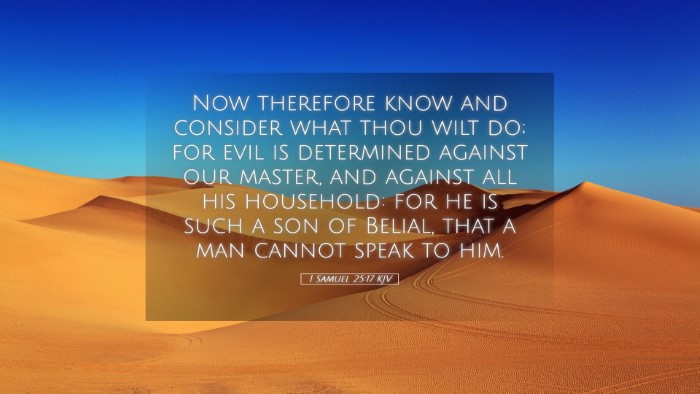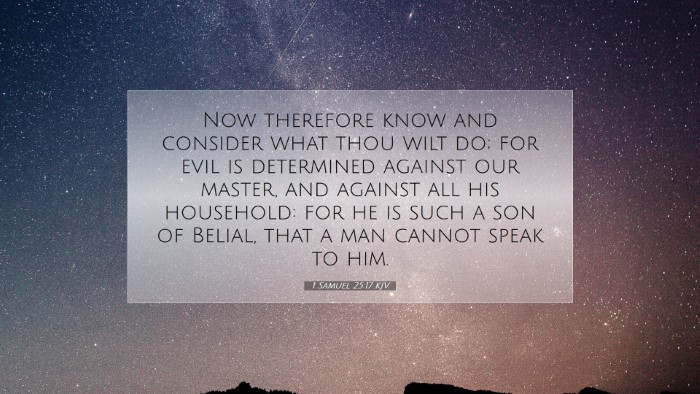Commentary on 1 Samuel 25:17
Verse: “Now therefore know and consider what you will do, for evil is determined against our master, and against all his household. For he is such a scoundrel that one cannot speak to him.” (1 Samuel 25:17, NKJV)
Contextual Overview
The narrative surrounding this verse is pivotal in understanding the character of David and the tensions he faced during his fugitive years. 1 Samuel 25 recounts the story of David, who, while in hiding from King Saul, encounters Nabal, a wealthy and ill-tempered man. Nabal's refusal to provide David and his men with assistance leads to a critical moral choice for David, one influenced heavily by Nabal's characteristics as described in this verse.
Insights from Commentaries
Matthew Henry’s Commentary
Matthew Henry emphasizes the importance of this verse in illustrating the precarious situation David finds himself in. He notes that Nabal's actions and temperament reflect both personal shortcomings and broader implications for David's leadership and ethics:
- Assessment of Nabal: Nabal is referred to as a “scoundrel,” indicating his immoral character. This characterization is crucial in understanding how his refusal of aid is not merely a social slight but a moral affront.
- Implications for David: David's response to Nabal's insult reveals his natural inclination towards justice and personal honor, showcasing the difficulty of his situation. Henry argues that it sets the stage for both conflict and resolution through Abigail's intervention.
- Moral Reflection: Henry calls upon readers to reflect on how reactions to insults can expose deeper moral foundations. The situation with Nabal acts as a case study for the consequences of pride and folly.
Albert Barnes' Notes on the Bible
Albert Barnes delves into the socio-political implications of Nabal’s conduct:
- Wise Counsel: The messenger’s advice to know and consider is a tactical approach to conflict resolution. Barnes highlights the importance of strategic thinking in moments of impending conflict.
- Character Studies: Barnes contrasts the character of David with that of Nabal. David, while facing injustice, must tread carefully to maintain his integrity and the loyalty of his men. Nabal's folly serves as a cautionary tale about the dangers of wealth without wisdom.
- Consequences of Actions: The phrase “evil is determined” foreshadows the potential violence that could ensue from Nabal's stubbornness, symbolizing the broader struggles between right and wrong in leadership.
Adam Clarke’s Commentary
Adam Clarke provides a deeper emotional and psychological insight into the events depicted in this chapter:
- Emotion and Decision-making: Clarke remarks on the emotional weight of the message delivered by David’s servant. The urgency of the situation compels immediate action, underscoring the necessity for leaders to grapple with both emotion and rationality.
- Cultural Context: Clarke elucidates the cultural norms concerning hospitality and respect in ancient Israel, noting that Nabal’s refusal is egregious in a world that places high value on communal bonds and mutual support.
- Divine Providence: The impending conflict is seen as part of God’s sovereign plan. Clarke suggests that God often uses such conflicts to mold character and prepare individuals for greater responsibilities.
Thematic Reflections
1 Samuel 25:17 encapsulates several key themes that resonate deeply with contemporary readers, pastors, and theologians:
- Leadership and Integrity: The scenario demonstrates the struggles of leadership in maintaining integrity under pressure. David, though wronged, faces a choice that tests his moral compass.
- The Importance of Wisdom: Understanding Nabal’s character is essential for navigating conflict. The wise course of action is not always the most apparent, and the verse acts as a reminder of careful discernment when faced with hostility.
- Divine Justice and Human Action: The interplay between divine justice and human action raises questions about fate, free will, and the moral decisions individuals face in challenging situations.
Conclusion
1 Samuel 25:17 serves as a profound lesson in human interactions, moral decision-making, and the complexities of leadership. The characters present, especially David and Nabal, highlight the contrasting nature of wisdom versus folly and the necessity for thoughtful responses in the face of provocation. For pastors, students, and scholars, the verse is not just a historical recounting but a timeless reflection on character, leadership, and the moral fabric that undergirds human relationships.


